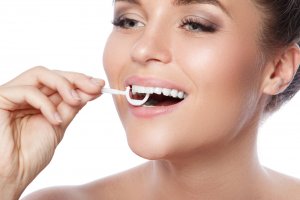How to Floss Your Teeth
Why does flossing matter?
Despite how critical flossing is for healthy teeth, only 40% of Americans report flossing their teeth regularly.
So why is flossing so important? Well, it all begins with the small food particles can easily get lodged in the gaps between your teeth and below the gum line.
When you brush your teeth, you scrub bacteria, plaque and food particles off the chewing surfaces and visible sides of your teeth. But a regular toothbrush can't reach the tight spaces between your teeth and under your gums. This is why you need to do some kind of interdental (between-teeth) cleaning, too.
If you don't thoroughly clean plaque from your teeth, it hardens over time and forms a substance called tartar. This thick deposit can't be removed by brushing or flossing teeth; only dentists can dislodge it with specialist tools during a scale and polish (and the process isn't exactly pleasant).

Plaque and tartar build-up on your teeth creates a breeding ground for bacteria, which then start attacking your tooth enamel. It also gives you bad breath, or halitosis. If plaque develops in pockets between the teeth and gums it usually leads to gum disease (gingivitis). This condition eventually causes teeth to become loose and even fall out if it's not treated.
Brushing your teeth properly twice a day is essential for keeping your teeth and gums healthy, and some of the best electric toothbrushes use a pulsing motion to help clean between teeth. But they are still not a complete replacement for flossing.
Summary of the benefits
To quickly recap, cleaning between teeth means:
- Cleaner teeth and gums
- Fresher breath
- Less need for painful tartar removal at the dentist
- Fewer cavities (and subsequent tooth fillings)
- Less risk of developing gum disease
- Improved oral health so fewer complications later in life
- Less money spent on dental work!
If this isn't good enough motivation for you, consider this: Looking after your teeth well now should mean that you need less dental work in the future. The cost of fillings, root canals, extractions, crowns, implants, etc. can easily add up, so you could say that flossing now will save you money on your future dental bills.
Conclusion
Flossing your teeth well is just one part of maintaining good oral health. In addition, you should:
- Use a fluoride toothpaste
- Limit your consumption of sugary foods and drinks, and avoid snacking on them throughout the day
- Get regular dental checkups and cleanings
Many people find it difficult to commit to flossing every day with normal dental floss. Thankfully, there are plenty of other options available, like picks, water flossers and interdental brushes. None of these alternative options tend to be quite as good as floss as getting the job done, so if you can stick to the real deal, while supplementing with other options, that would be ideal.
While you're brushing up on your flossing technique, we also recommend you have a look at our separate guide to how to brush your teeth.
If you have any concerns about the state of your teeth, don't put off going to the dentist. The longer you leave it, the worse the problem is likely to get. You'll feel much better once any issues have been treated!
FAQs
How do I remove floss stuck between teeth?
If you have floss stuck between your teeth, you should first rinse your mouth with lukewarm water to see if it reduces any swelling that might be causing the floss to stay stuck. Another trick is to try a water flosser to force the floss out without harming your gums, and if that doesn't work, grab the stuck floss from one end and pull it out in a gentle motion.
How often should you floss teeth?
You should floss your teeth once a day, either in the morning or at night, before or after brushing. Most dentists agree that it doesn't matter when you floss, it just matters that you do floss. So choose a time that best works for you.
Is it too late to start flossing?
No! It's not too late to begin flossing. However, if you've never flossed before, your gums may bleed during the first few days. You'll also notice some swelling, and even mild pain. Be gentle and stick with it!
